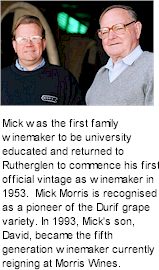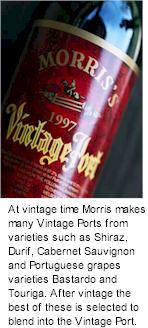


Morris Wines, established in 1859, is the continuing story of five generations of family winemakers. George Francis Morris established his vineyard and winery near Rutherglen in North Eastern Victoria. He planted a trial vineyard plot of ten acres at Fairfield two miles east of the current Morris Mia Mia winery location. By 1885 Morris planting's had grown to over 200 acres making them the largest wine producer in the Southern Hemisphere. By the late 1890s the devastating spread of Phyloxera, an aphidlike insect that attacks and kills vines, crippled the Rutherglen district.

In 1897 Charles Hughes Morris, son of George, established a new vineyard at Mia Mia only a few kilometres away from the original Morris plantings. Selling his prize-winning horse, Fairfield, to develop the property, the Morris winemaking tradition continued and the image of the show jumping horse would become the company trademark. In 1917 disaster struck again, due to the devastating spread of Phyloxera, the Morris Fairfield Estate and Winery was sold.
In the 1930s Charles Hugh's eldest son, Charles Tempest Morris took over the operations, guiding the business through an era of depression and war that saw immense changes in the growing Australian wine industry. Plantings and production were expanded, and son Charles Henry Mick was introduced to the philosophies and traditions of Morris winemaking.
Mick Morris was the first family winemaker to be university educated and returned to Rutherglen to commence his first official vintage as winemaker in 1953. In 1993, Mick's son, David, became the fifth generation winemaker, he is still currently reigning at Morris Wines. Combining 145 years of winemaking tradition with modern techniques David is the most awarded winemaker in Australia.

Morris is renowned and highly acclaimed for it's production of luscious fortified wines with long cellaring potential. The Morris premium muscats and tokays are one of Australia's great secrets and are highly prized by overseas drinkers in the know. The demand for these amazing fortified wines within Australia has been so great that exports have been very limited. Their success has tended to obscure the fact that Morris is also a producer of a limited range of premium table wines. Durif was one of the notable varietals planted in the 1920s. Morris is now renowned for their big Durif wine, and some might say that it has almost as much character as Mick Morris himself.
The corrugated iron winery, with its wax-lined concrete fermenting vats and ancient equipment, is a true icon of Australian design, capturing the essence of the 1897 winery. Located within the heart of the winery, the atrium style Cellar Door was designed by legendary Australian architect Robyn Boyd and constructed in 1972. Offering views of the century old storage casks and famous dirt floors, the Cellar Door provides an up close experience to the making of world famous wines. It's a link with the past, those good old days when Rutherglen provided two thirds of Victoria's wine, and Victoria in turn provided two thirds of Australia's total wine production until it was wiped out by phylloxera at the turn of the last century.
Since 1993 David Morris has won more awards than any other individual winemaker in Australia. In 2001 the Morris Old Premium Liqueur Muscat was rated Best Muscat in the World at the Muscats of the World competition in Frontigan-La-Peyrade, France. At home it was rated 2001 Wine of the Year by Winestate magazine. Under David Mrris's guidance, the Morris range of table, fortified and sparkling wines collected an amazing tally of 20 trophies and 223 medals including 80 Gold in 2003 alone.
